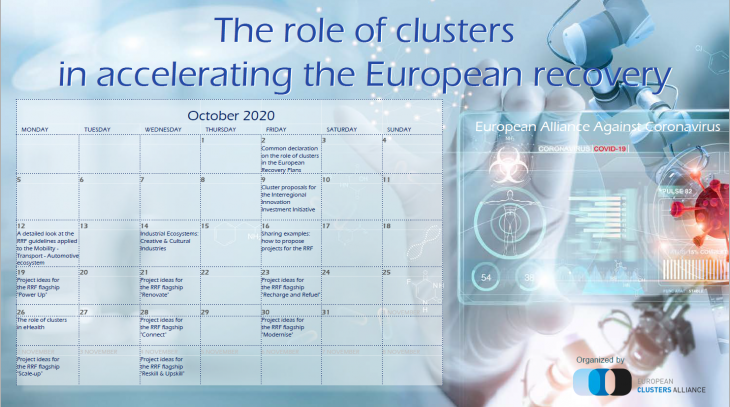European Clusters Alliance: Joining forces. Collaborate to answer to the crisis
The European Clusters Alliance shares the Spanish experience of a quadruple helix collaboration in facing the challenges caused by the COVID-19 pandemic. Fighting the coronavirus requires innovative ideas, quick responses and numerous helping hands. Therefore, people are working on multiple levels: local, regional, national, European. And they come from different entities: industry, academia, government – and society. All are important and serve different purposes.
There are makers who develop innovative solutions for much needed medical equipment. There are universities which offer their research and knowledge to scientifically validate ideas. There are companies which repurpose materials, machinery and whole production chains. There are regional and national governments that create the framework for our actions and indicate the path to follow. And there is the European Union that sets a common ground for all Member States. In between, clusters help connecting these stakeholders, facilitating the flow of information, contacts and queries, and down or upscale solutions or directions. Everybody contributes in the way they do it best. In order to get the help to the people in need, it is of high importance to find a model of collaboration between these entities - and implement it. Clusters are a key instrument to this model, being the axis for the quadruple helix. To give an example, we look at Spain. Due to the high number of infected people, hospitals need to be provided with enough protective masks and respirators. Many volunteers have offered to 3D-print the needed products or to contribute with material, designs or machinery: - Individuals via the makers community, which has created networks in all the Spanish autonomous communities and channels their activities through a handful of representatives. - Companies, with the coordination at first level of their regional clusters, and ultimately of the Spanish Federation of Clusters, which channels all resources in a “capacities map” that is shared with the responsible national and regional ministries. - Universities, via either the makers community, clusters or directly via public authorities.To achieve a quadruple helix of collaboration (industry, academia, government and society) and to ensure the operability of the networks, representatives of these different entities have reached out to each other and created a forum of volunteers at a high level. They established a conference call daily. From their respective perspectives, they
- exchange information on current demand and supply, - discuss unsolved issues about design, material, distribution and funding, - share ideas of matching the demand with the offers, - and align the bottom-up initiatives with the routes of action of the national government and the European Union.
This way, the contributions of companies, makers and universities are all taken into account and will be put to efficient use – with the goal to maximise the supply of masks and respirators for the hospitals. This chain of collaboration is not exclusive to the printing of medical goods. It is applicable to the need of the respective country. The advantage is clear: every contribution is valued, essential information is being shared, decisions are made together, and help is organised efficiently.
What can be done on national level is also possible for Europe. Therefore, the European Clusters Alliance promotes the creation the above mentioned forum of volunteers on a European level. Because joined forces will go a long way.
